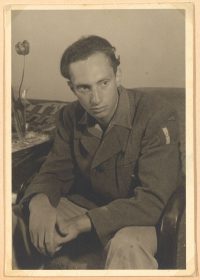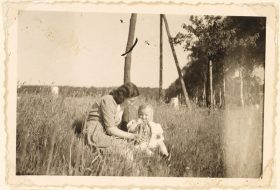The fourth episode in our blog series “Memories from the Life of Walter Frankenstein”

Walter Frankenstein during his time in the kibbutz, Greifenberg, around December 1945–May 1946; Jewish Museum Berlin, gift of Leonie and Walter Frankenstein
What were they to do now? Nothing was left of the Frankensteins’ old life. Their relatives and friends had been murdered, including Walter and Leonie’s mothers. All of Europe lay in ruins.
The first step in the Frankensteins’ new life was a simple administrative act: they registered with the Jewish Community of Berlin and were assigned an apartment. However, due to the bad supply situation, they were advised to leave Berlin as soon as possible. Nevertheless, they decided to spend the summer in Berlin. Walter volunteered as a manager for the Neukölln Leisure Games. At the same time, he made contact with the Jewish Brigade. Over the course of the war, the British Mandate government had drastically reduced the channels for legally entering Palestine. That meant that for the roughly 250,000 displaced persons ( DPs) in camps in western Europe, illegal entry was often the only way to reach Palestine. Walter managed to arrange an opportunity for legal emigration for Leonie and the children through the members of the Jewish Brigade. In return, he promised to smuggle young Jews southward through Germany for the Brigade. Their destinations were harbors on the Mediterranean where underground Jewish organizations prepared ships for their illegal entry into Palestine.
→ continue reading
On the occasion of the International Holocaust Remembrance Day, we recommend listening to Ruth Klüger’s speech – for the first time or once again. On 27 January 2016, the author talked in the German Bundestag about her experiences as a 13 year-old forced laborer in the women’s camp Christianstadt (Krzystkowice).
Introduction of Bundestag President Norbert Lammert and speech by Ruth Klüger (from 20:10) on 27 January 2016.
This year’s Ceremony of Remembrance in the German Bundestag will take place on Wednesday, 31 January 2018 at 1 pm. Anita Lasker-Wallfisch will give the commemorative speech. The ceremony will be broadcast live from 1 pm on the website of the Bundestag. You will find the English version at (www.bundestag.de/en).
The third episode in our blog series “Memories from the Life of Walter Frankenstein”
“Her and no one else,” said Walter Frankenstein the first time he saw his future wife Leonie Rosner in the courtyard of the Auerbach Jewish Orphanage. Leonie was from Leipzig and in Berlin she had begun training at the Jewish Seminar for Nursery School Teachers.

Leonie Frankenstein with her son Peter-Uri sitting in a meadow, Brzeźno in Gorzów County (German: Briesenhorst), May 1944; Jewish Museum Berlin, gift of Leonie and Walter Frankenstein
After it was closed, she came to the Auerbach Jewish Orphanage as an apprentice. Soon after her arrival, Leonie’s room quickly became the place where apprentices living in the orphanage met. Seventeen-year-old Walter grew closer to Leonie (three years his senior) over conversations about religion, Judaism, emigration to Palestine, and daily life. In fall 1941, after the director threatened to fire Leonie over her behavior toward a student, the young couple decided to leave “Auerbach”. Walter and Leonie subletted a room with the Mendel family in Prenzlauer Berg. Soon after that they decided to get married. They had heard that married couples would be spared deportation. Under-aged Walter had to get his mother’s permission for the wedding, which took place on February 10, 1942.
→ continue reading

